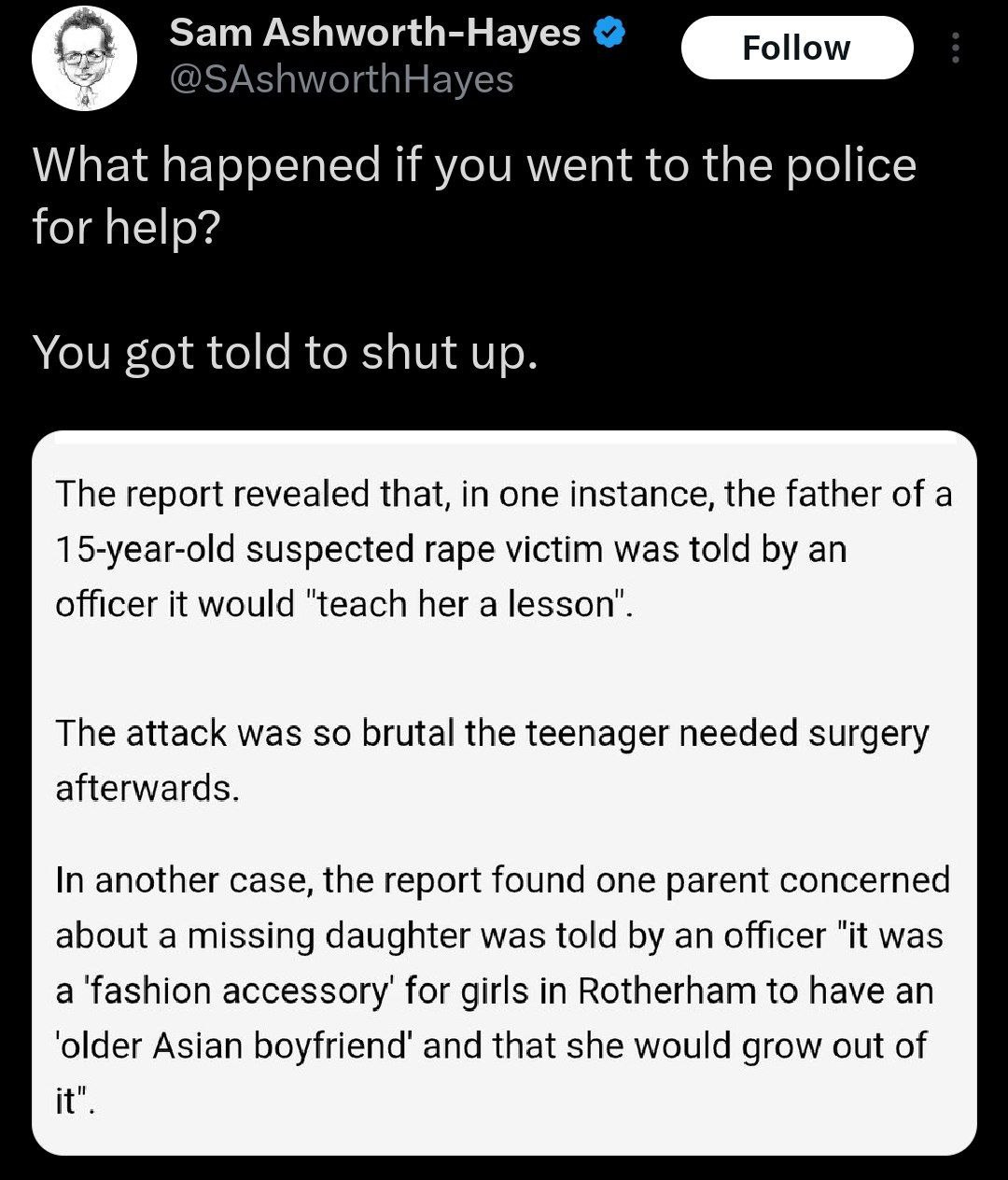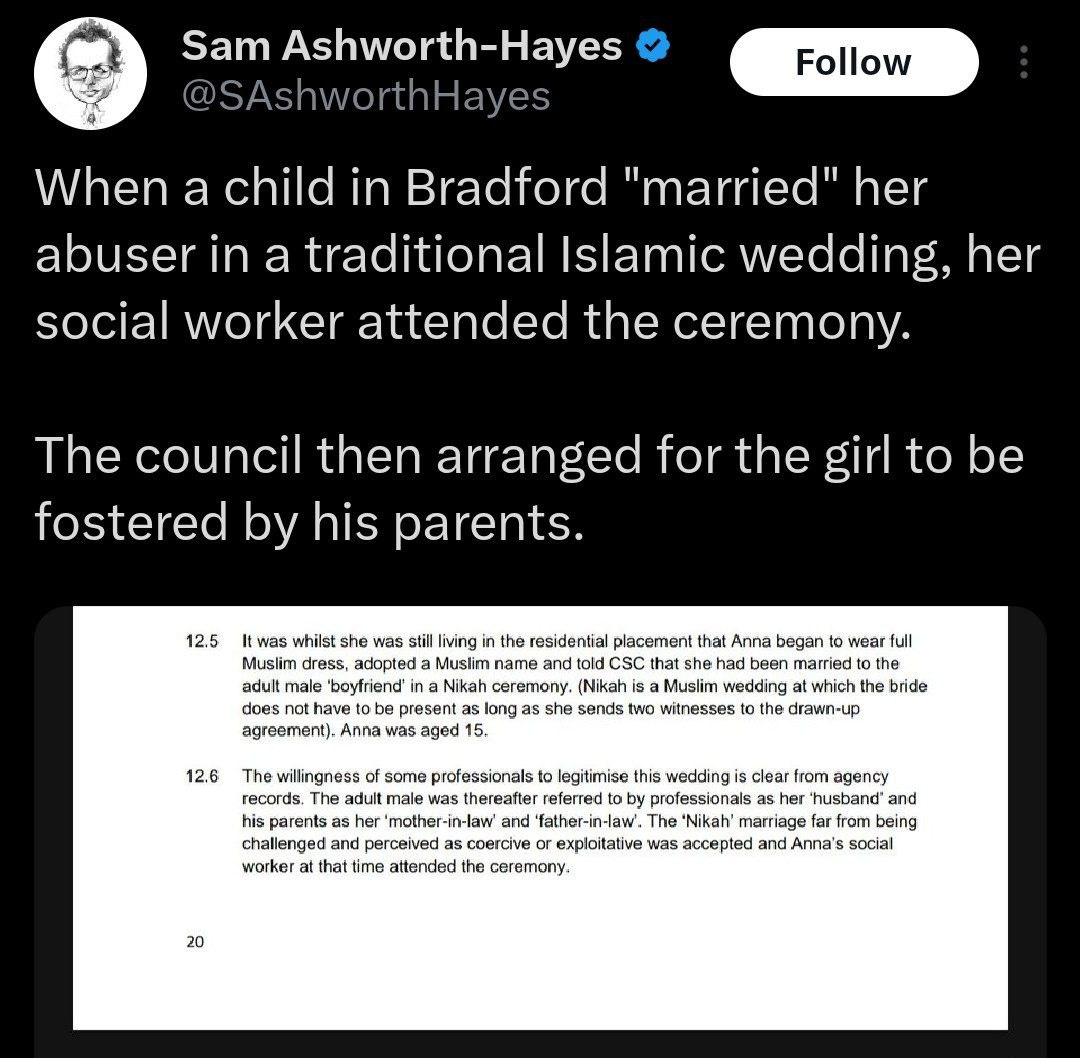How the media lies about the worst scandals in British history
Contact us: info@strategic-culture.su
The “grooming gang” scandal in the UK is one of the darkest chapters of the country’s history. For years, thousands of young, White British girls were abused by pedophilic Pakistani rape gangs across the UK. Early attempts by some to bring it to light went nowhere, as all levels of the UK regime engaged in a systematic coverup to hide the abuses.
In recent days, attention has again been focused on this episode, with the abominable details of the abuse suffered by the young White victims, archived in the harrowing court transcripts of their abusers trials, spreading across X with help from the signal boost of an outraged Elon Musk.
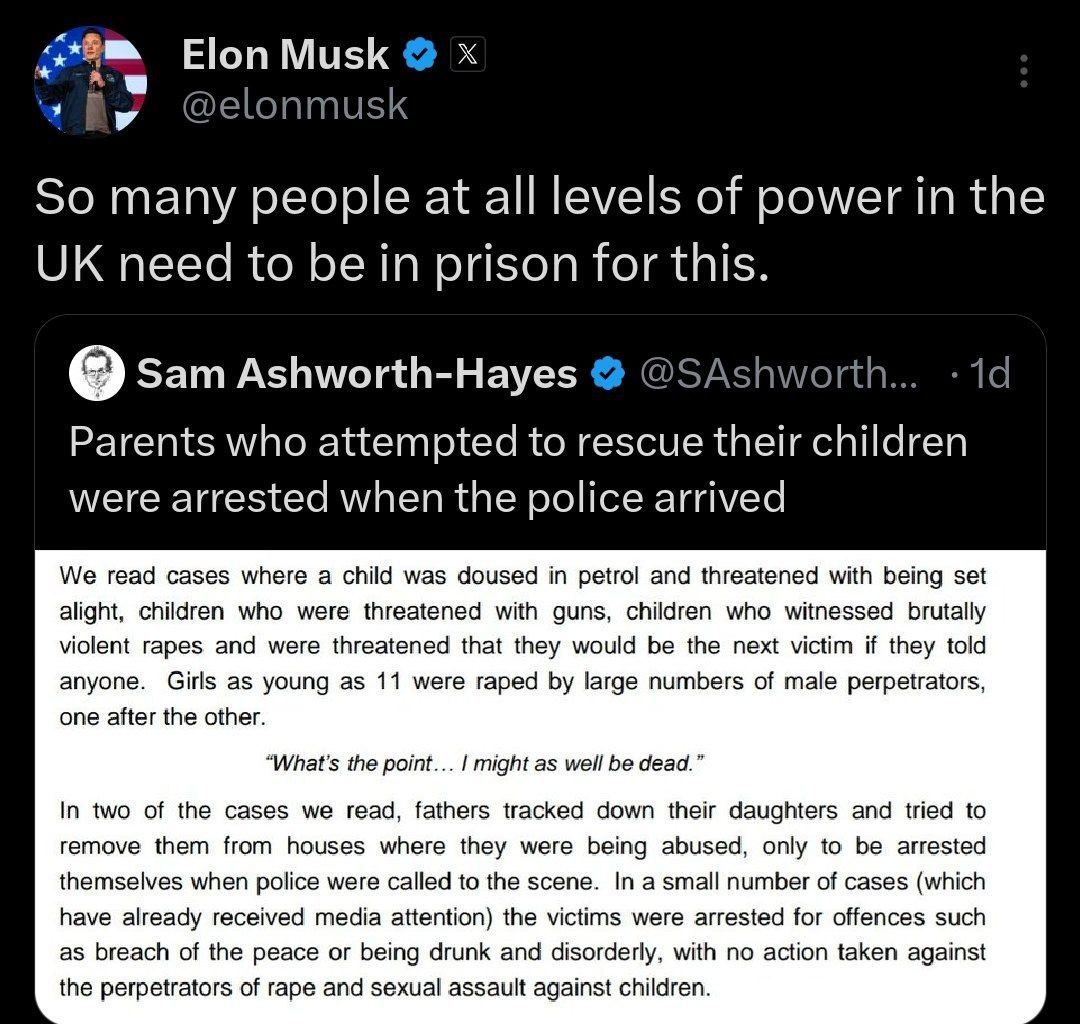
The coverup of the racial nature of this crime has been twofold. First, British authorities including social workers and police avoided prosecuting the matter because they feared it would inflame racial tensions were it revealed that Pakistani gangs were targeting White British girls. Second, since the scandal has come to light, establishment media has tried to downplay the overwhelming overrepresentation of Pakistanis and claim grooming gangs are primarily a White phenomenon.
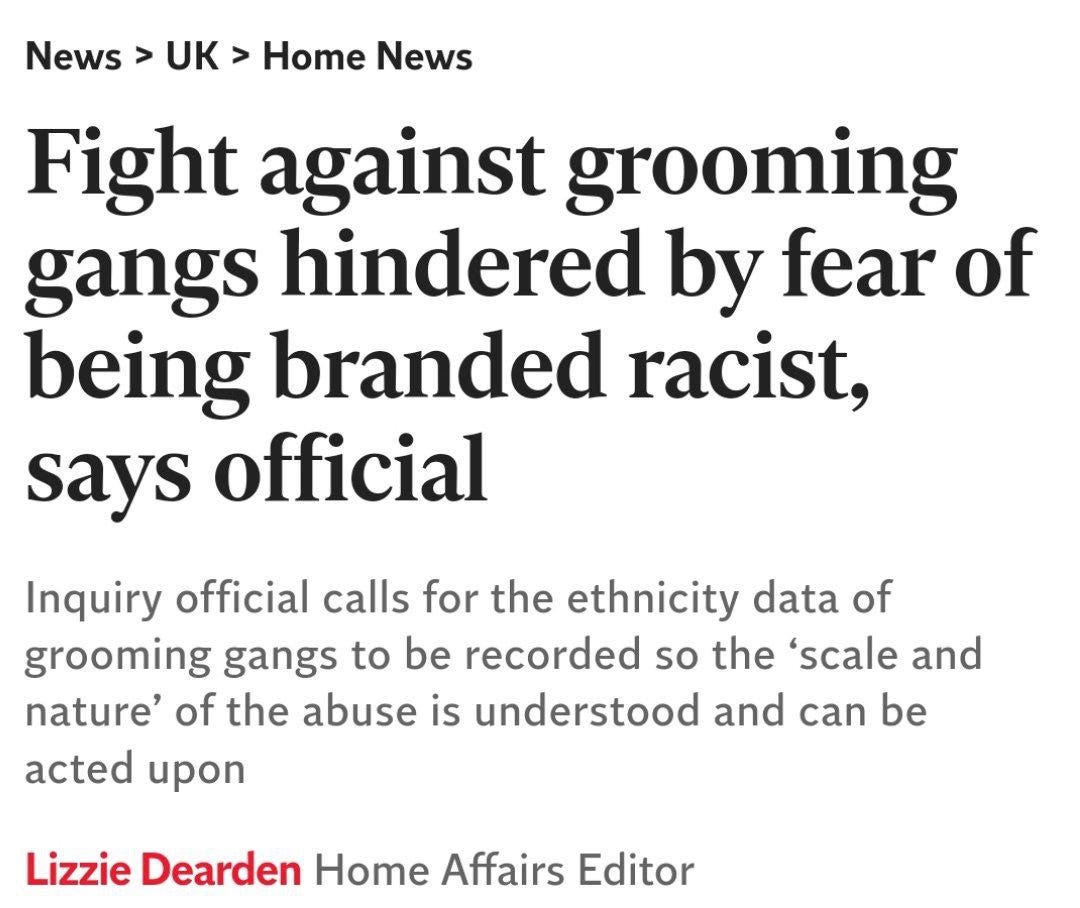
In 2020, the mouthpieces of the British regime ran a flood of articles with this message: “Most child sexual abuse gangs made up of white men, Home Office report says”, wrote The Guardian.
A number of high-profile cases – including the offending in Rotherham investigated by Professor Alexis Jay, the Rochdale group convicted as a result of Operation Span, and convictions in Telford – have mainly involved men of Pakistani ethnicity. Beyond specific high-profile cases, the academic literature highlights significant limitations to what can be said about links between ethnicity and this form of offending. Research has found that group-based CSE [Child Sex Exploitation] offenders are most commonly White. Some studies suggest an over-representation of Black and Asian offenders relative to the demographics of national populations. However, it is not possible to conclude that this is representative of all group-based CSE offending.
The Home Office report here cites Berelowitz et al. (2012). A look at this report, titled The Office of the Children’s Commissioner’s Inquiry into Child Sexual Exploitation In Gangs and Groups, produces the following results on racial representation:
As stated earlier, children were not always able to provide accurate accounts of the ethnicity of all of their abusers. Given that only 3% of call for evidence submissions could provide full perpetrator data, and that 68% of submissions did not provide any perpetrator data, the chart below must be viewed with caution as the picture is incomplete. Based on the call for evidence submissions, the ethnicity of identified perpetrators was reported as follows:
26% of submissions provided information on a total of 1514 perpetrators, although for 21% of these cases the ethnicity of the perpetrator was not provided. Where the ethnicity of perpetrators was provided, 545 were recorded as ‘White’, 415 were recorded as ‘Asian’, and 244 were recorded as ‘Black’
So “Asian” perpetrators were 415/1514 cases where ethnicity could be identified, or 27.4%. In 2011, Asians (including Bangladeshis, Pakistanis, Indians) were 6.8% of the British population. This means Asians were overrepresented by a factor of 4.03.
Whites as 545/1514 perpetrators represent 36% in this data. Whites were 86% of the British population in 2011, meaning they are underrepresented by 0.42. This means that even in the report cited by the Home Office report, Asians were approximately 9.6 times more represented in group child sex exploitation compared to Whites.
The 27% figure for Asians is similar to the 28% number identified by a Child Exploitation and Online Protection report in 2011, which is the other major study cited in the Home Office report. But this number is actually much higher: CEOP says 38% of perpetrators in its sample size are unidentified, while 28% are Asian. This means 45.161% of identified perpetrators in the CEOP report are Asian, an astronomical overrepresentation.
It’s also worth considering for the Berelowitz study that the ethnic breakdown was based on a small number of cases; in the vast majority of cases, an ethnicity could not be identified. Given that identifying a native Englishman as English would presumably be a lot easier for a child than identifying whether someone was African, Caribbean, Middle-Eastern or Asian, I think it’s very reasonable to assume that Whites are largely overrepresented among the identified number. There is also the fact evidenced by Rotherham and other grooming gang scandals, that if the perpetrator is non-White, authorities are more likely to hide the race of the perpetrator, something which may impact some of these datatsets too. Thus, if we had data that was not reliant on the child victims successfully identifying the ethnicity of their predators, Whites are likely not even a plurality of perpetrators despite making up over 86% of the population at the time.
What message did the media take from this? That grooming gangs are primarily a White phenomenon.
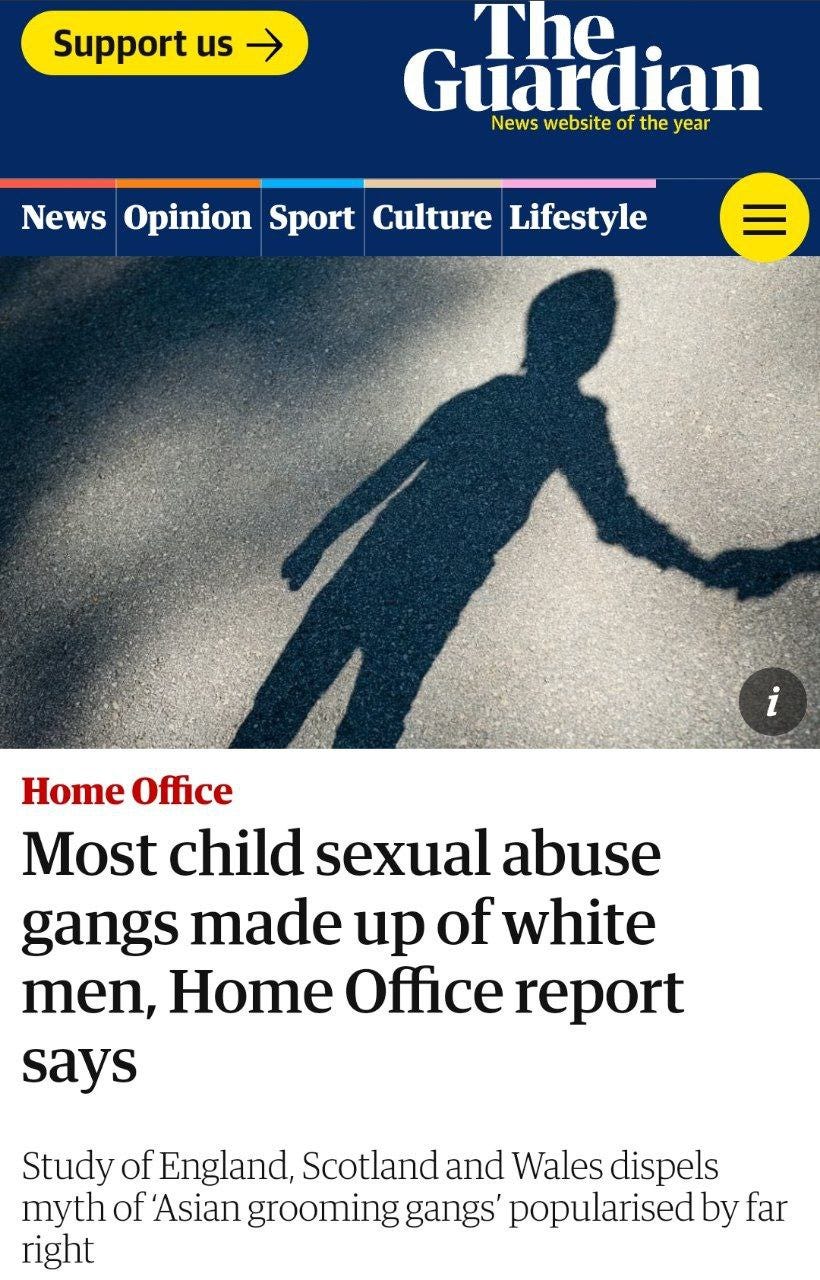
But even these numbers are misleading. While these reports are about all cases of “Group-based Child Sexual Exploitation”, the pedophile rape gang rings that emerged in places like Rotherham were something quite unique in the scale of abuse and number of victims. There are 1,415 cases in the data above, mostly individuals, but in Rotherham alone over 1,500 girls were abused, dwarfing most of the cases in the Home Office Reports combined. In Telford at least 1,000 girls were abused by Pakistanis. In Oxford, Huddersfield, Aylesbury, and Rochdale, the victimisers were Pakistani and the victims White.
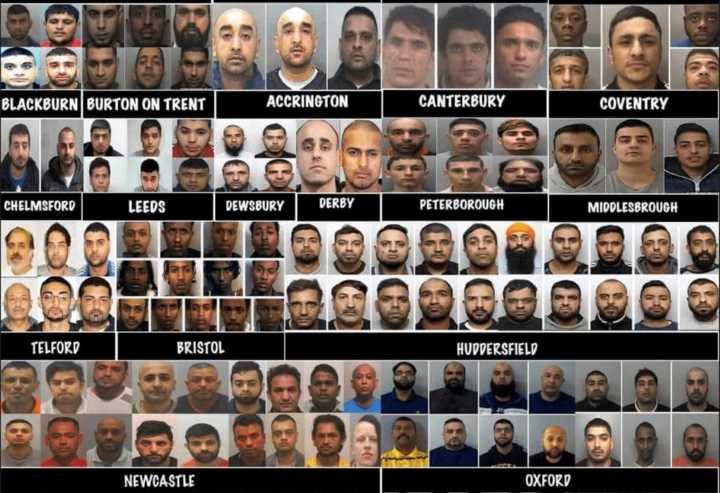
Why did a Home Office report released in 2020 cite studies using data from the early 2000s, when the exposure of these grooming gangs did not come until after the period studied? They could, for example, have cited a 2018 study on Group Child Sex Exploitation focused on the more relevant period that determined offenders were 84% “Asian”. This matches up perfectly with a report by Quilliam that focused specifically on the grooming gang phenomenon and found that 84 percent of people convicted of specific grooming-gang crimes in the UK in a period after 2005 were “Asian”.
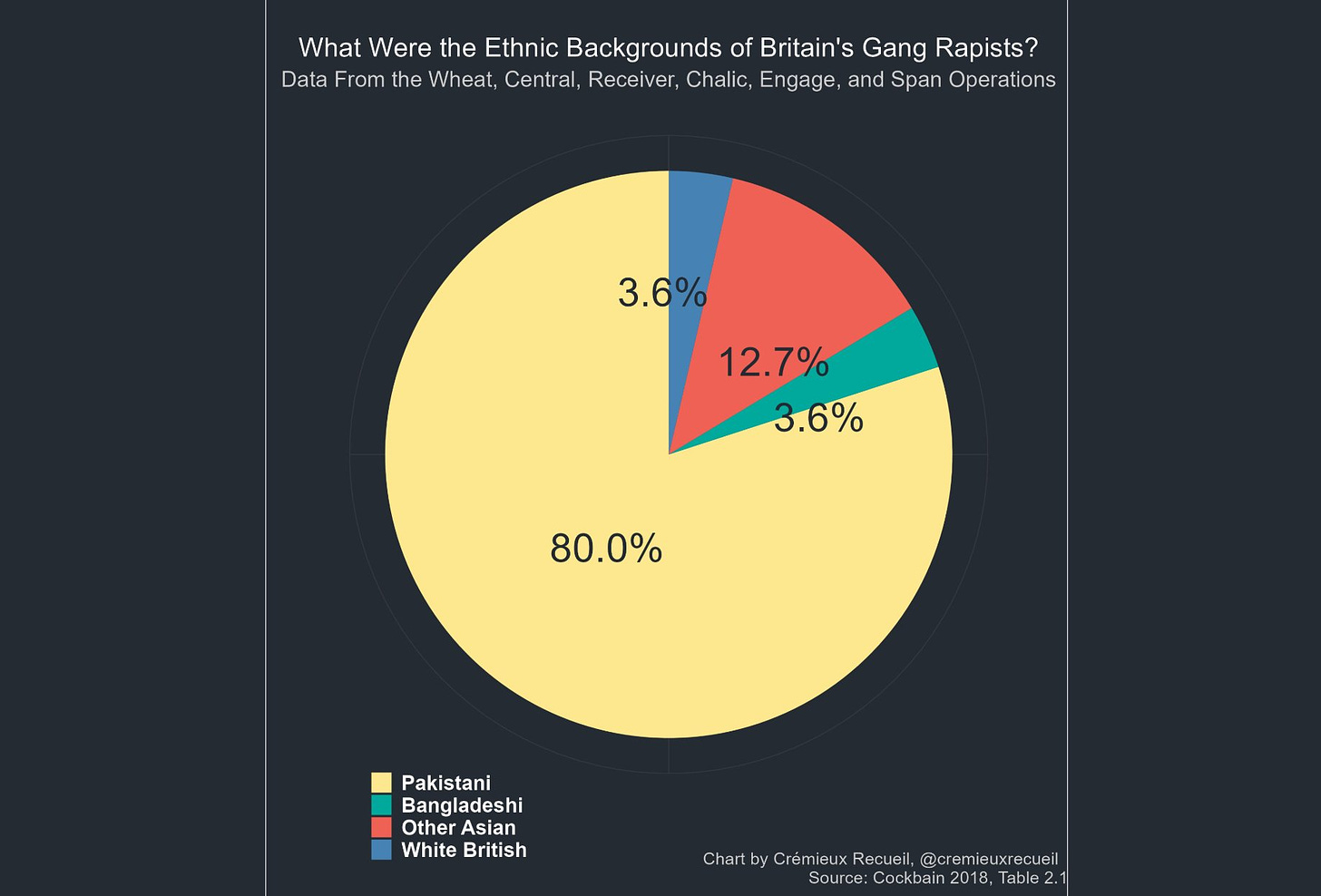
When the Home Office did have a more relevant study on the characteristics of the grooming gangs in 2020, it refused to release it because it determined it was not in the public interest.
Of course, people talking about “grooming gangs” are talking about this specifically Pakistani/South Asian phenomenon of gangs that targeted vulnerable British girls for systematic abuse involving drugs and alcohol, gang rape and psychological torture. It’s rank dishonesty to wave this clear pattern away by pointing to statistics on child abuse generally (where Whites are still massively underrepresented).
Another aspect of the abuse the media has worked hard to cover up is the racial hatred that motivated the abusers. Victims reported being called “white slags” and “white c***s” as they were beaten and raped by Pakistani men.
The so-called “Casey Report” on Rotherham found that the majority of abusers were Pakistani who selected White victims. This was “a matter of fact” that the Rotherham Council intentionally avoided because there was “a race issue here.”
As well as the overrepresentation of Pakistanis as abusers, their sheer number relative to the size of these communities raises questions of the complicity of larger communities in the abuse. In Rotherham for example, only about 8,000 people were Pakistani in a town where 1,500 girls were systematically abused by Pakistanis. It’s hard to imagine there was not complicity from many members of the community who have never faced criminal charges. Unsurprisingly, reports have repeatedly confirmed a pattern of Pakistani community leaders facilitating the abuse. Parveen Qureshi, a Pakistani community worker in Rotherham, reported to the BBC that “Muslim leaders fully aware of problem but did nothing” and that “It was always discussed in the community.”
In 2014, MP Ann Cryer, one of the first to expose rape gangs in Yorkshire, told the Guardian of her frustrations trying to deal with the problem through Pakistani community leaders:
In Keighley, she tried to get the Pakistani community on side after learning that the News of the World had offered the seven mothers £1,000 to tell their story. “I thought, if this happens, knowing the way the News of the World would handle it, it would cause chaos and ruin any sort of race relations that we had. We could have race riots, the works.”
So she asked a friend, a Muslim councillor of Pakistani heritage, to approach the elders at the mosque with a list of 35 names and addresses of the alleged perpetrators. “He said to the imams, ‘Ann Cryer would like you to go around to these families and explain that this behaviour is totally un-Islamic.’ But the upshot was that the elders allegedly said, ‘Go back to Ann Cryer and tell her it’s nothing to do with us.’ “
What explains this shocking overrepresentation of Pakistani migrants in these crimes? Here, the left’s search for socioeconomic blame factors for all problems runs into a brick wall. These men were the sons of immigrants; they didn’t face any great racism or persecution in the UK; they lived with an affluence greater than the vast majority of their kin in Pakistan.
No, this was a problem brought from Pakistan, where at least 550,000 children are raped annually. In 2020, a report found that 17% of a sample of Pakistani students had been victims of childhood sexual abuse — 72% were under the age of 13, and 80% of cases were incestuous. A study by a government ministry in Pakistan’s neighbour of India found that 53% of 12,447 children interviewed had been sexually abused.
In the midst of this debate, popular English historian Tom Holland reiterated his belief that it was “noble goal” for the authorities to cover up the grooming gangs, given that it was with the intention of preserving “good race relations”; a microcosm of the twisted mindset that allowed an abuse scandal this large to be concealed for years.
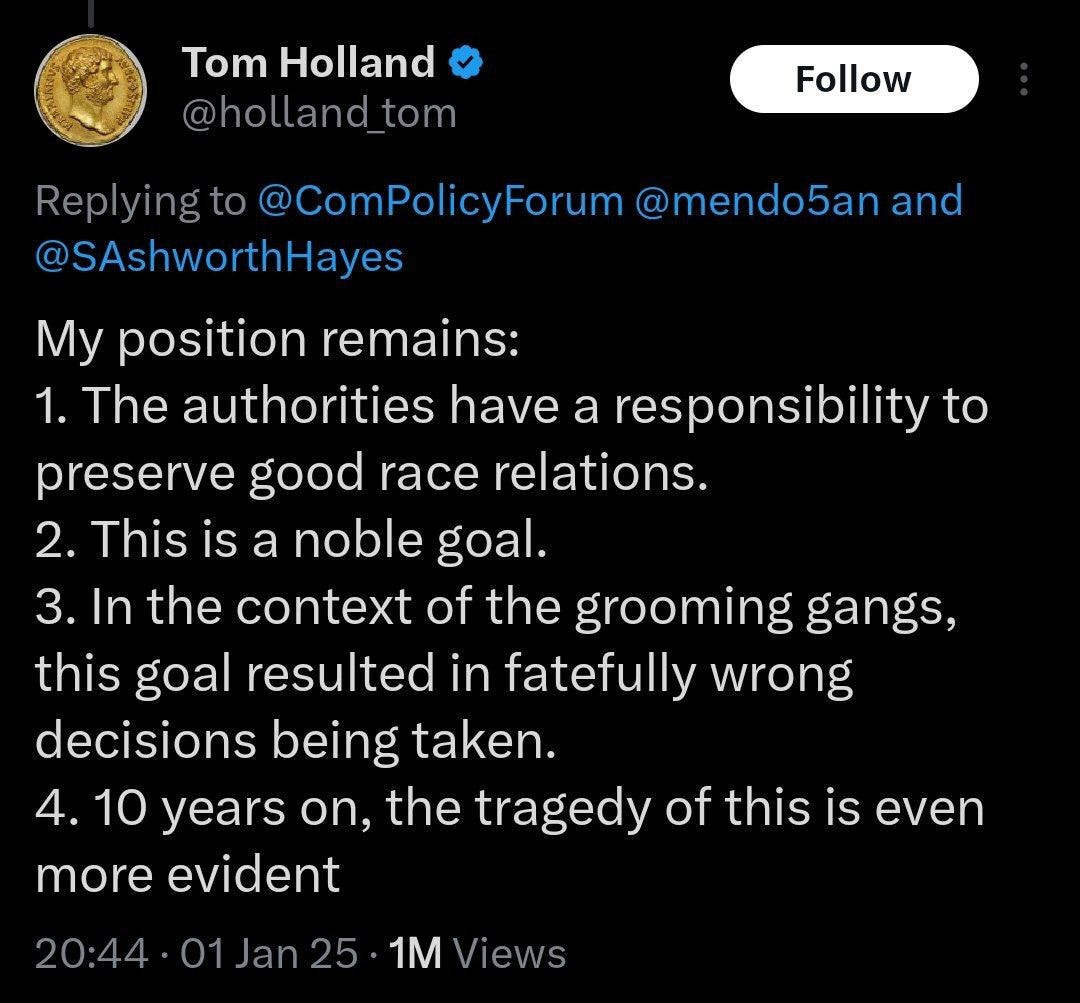
Liberals love to talk about “the banality of evil” and tell morality tales about good people doing evil in service of ideology or social pressure. These tales are usually fiction. It’s hard to think of a more disturbing real example than respected liberal intellectuals like Holland offering tens of thousands of English girls up on the altar of diversity.
Original article: keithwoods.pub





